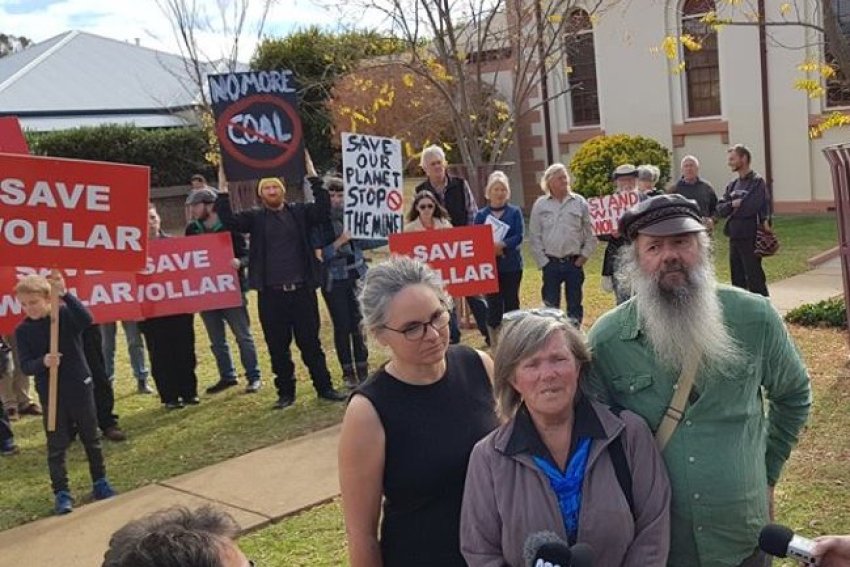
Charges brought against the so-called “Wollar Three” under New South Wales’ controversial anti-protest laws were dismissed by a Mudgee magistrate on June 5. However, the laws remain a threat to the right to protest.
The Wollar Three — Bev Smiles, Bruce Hughes and Stephanie Luke — were arrested on April 12 last year for protesting against the expansion of the Wilpinjong coalmine, which would expand the mine to just 1.5 kilometres from the village.
The three activists were the first to be charged under draconian anti-protest laws introduced in March 2016. They faced a possible seven years’ jail.
The Wilpinjong coalmine is owned and operated by Wilpinjong Coal, a subsidiary of Peabody Energy Australia, whose parent company, Peabody Coal USA, is the world’s biggest private sector coal company.
The mine has been operating in Wollar, near Mudgee in mid-western NSW, for 10 years. Its noise and toxic fumes have badly affected the Wollar community. Aboriginal cultural heritage is being destroyed and the mine has already caused serious environmental damage.
As the mine has encroached on Wollar, its community has fled. Once it was a thriving community, but today only three properties remain in private ownership. As people moved away, services and social support that had made village life viable have been withdrawn. Wilpinjong Coal now owns most of Wollar village.
The last straw for those still living in Wollar was on April 11 last year, when the Planning Assessment Commission (PAC) approved the mine’s extension.
The expansion will require 354 hectares of native vegetation to be cleared, including 9.5 hectares of box gum woodland listed as a “threatened ecological community”. The few remaining private landowners saw they would be left with worthless land, with neither the state nor the mining company offering compensation.
The NSW government has removed the community’s right to appeal the merit of PAC decisions about coalmines in the Land and Environment Court. With no legal option open to them, the community was driven to protest.
The day after the PAC’s decision, about 25 members of the Wollar Progress Association and supporters began a peaceful blockade of the site’s entrance, preventing mine workers from entering. Police were called and the three were arrested when they refused to move.
A year later, the three faced court. To cheers from the public gallery, Magistrate David Day dismissed the charges that Smiles, Hughes and Luke had “rendered a public road useless” and “hindered the operation of equipment belonging to a mine”. He found them guilty of the lesser charge of obstructing pedestrians and drivers but did not record a conviction and imposed 12-month good behaviour bonds.
Day said: “There’s no evidence that the road was rendered useless, it was obstructed and easily cleared. I observe that it was a blockade, not unlike the old style union picket lines, not seen much in recent times.”
He also found that police had not provided evidence the machinery cited in the charge was owned by the mine. But, he said, if police had charged the three with hindering equipment “associated with” the mine, rather than belonging to it, they would have been successful.
Outside the court, Sue Higginson from the Environmental Defenders Office, who represented the three activists, said that as the charges were dismissed on the technical issues of whether the road was rendered “useless” and who owned the equipment, the anti-protest laws, which restrict the right to demonstrate, remain untested.
NSW Greens justice spokesperson David Shoebridge said the case showed the deep illegitimacy of laws that seek to criminalise protests.
“They were peacefully protesting to protect their homes and the environment, and they had every right to do so,” he said. “The Liberal National government was so desperate to silence protest and dissent that they rammed through a raft of draconian anti-protest laws in 2016. Today people power has been vindicated.
“Bev, Stephanie and Bruce were the first to be prosecuted under the Liberal National government’s anti-protest laws, and today’s judgement has shown just how illegitimate those laws are.”
NSW Greens mining spokesperson Jeremy Buckingham called for the law to be changed so those protesting against mining operations would not face jail.
“I’m very pleased that the court has dismissed the serious criminal charges that these brave protesters faced,” he said. “But the draconian anti-protest laws brought in by the [Mike] Baird government need to be urgently repealed as future cases may result in a significant injustice.
“The lack of evidence meant that the magistrate did not have to consider whether these anti-protest laws breach the implied freedom of political communication under the Australian Constitution.
“This is still a live question that should be answered by the parliament by repealing these laws and guaranteeing the freedom of political communication — the right to protest.”
Buckingham called on NSW Premier Gladys Berejiklian to listen to the legal experts who warned that “these laws and associated penalties represented significant overreach”.